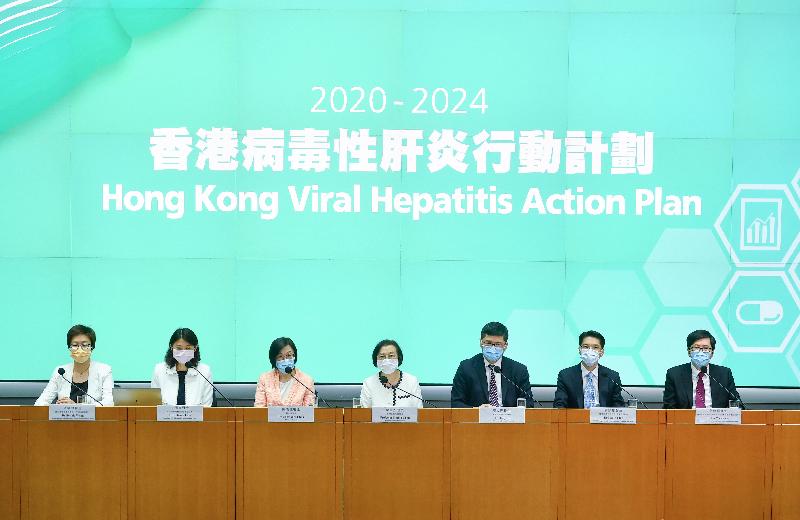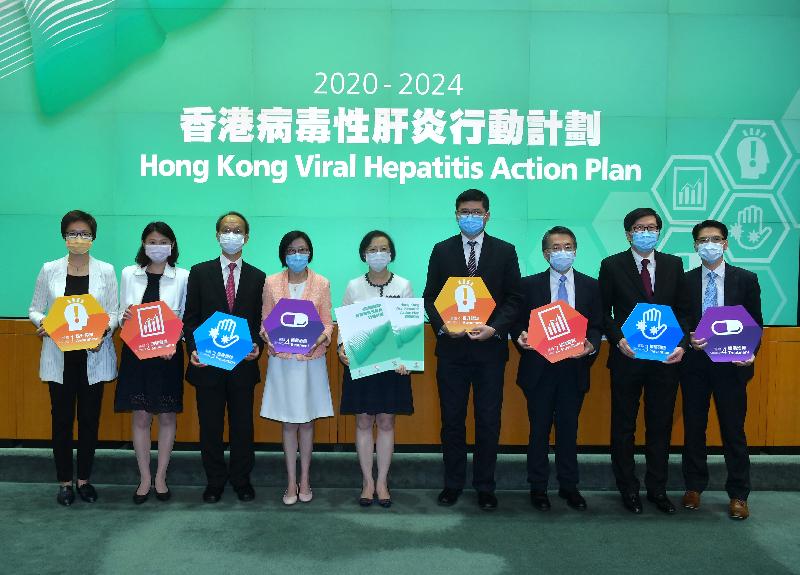Government promulgates Hong Kong's first viral hepatitis action plan (with photos)
**********************************************************************************
Speaking at a press conference, the Secretary for Food and Health, Professor Sophia Chan, said the public health threat posed by viral hepatitis has been a matter of concern of the Government. The Action Plan is the first blueprint formulated to cope with viral hepatitis, which demonstrates the importance attached by the Government to the work on prevention and control of hepatitis. It sets out the concrete actions and timetable of the implementation of various actions by the Department of Health (DH), Hospital Authority (HA) and other stakeholders, and formulates goals and priority actions for individual strategies to drive the progress in eliminating hepatitis. The Action Plan also formulates a number of indicators to assist in monitoring and evaluating the implementation of concrete actions.
At present, there are around 540 000 hepatitis B virus (HBV) and 22 000 hepatitis C virus (HCV) infection cases respectively in Hong Kong. HBV and HCV infections may lead to chronic hepatitis. Persons with chronic hepatitis may develop cirrhosis and liver cancer. According to studies, over 70 per cent of liver cancer cases in Hong Kong are related to HBV. According to the data from the Hong Kong Cancer Registry, it is predicted that liver cancer is the third leading cause of cancer deaths in Hong Kong with around 1 500 deaths.
Given the public health threat posed by viral hepatitis, the Steering Committee on Prevention and Control of Viral Hepatitis co-chaired by the Director of Health and the Chief Executive of the HA formulated the Action Plan this month in accordance with WHO's advice, international practices and local situation. The Action Plan adopts the four strategic axes in the action framework of the WHO, namely awareness, surveillance, prevention and treatment, and formulates priority actions for each strategy, so as to achieve WHO’s goal in eliminating the public health threat posed by viral hepatitis:
(1) Awareness: To raise public awareness and knowledge of viral hepatitis, the Government will arrange community engagement and awareness enhancement on HBV and HCV infections addressing the needs of different target groups, such as the general public, healthcare workers, at-risk populations, patients and their service providers. The strategies include launching awareness campaign for the general population, providing professional training, educating at-risk populations and building a supportive environment.
(2) Surveillance: The Government will continue the current surveillance on viral hepatitis. A set of 12 local indicators are adopted for close monitoring of the progress towards the WHO targets and ensuring the comparability of the indicators over time.
(3) Prevention: In epidemiology, mother-to-child transmission (MTCT) is the major route of HBV transmission and it is the main reason for its prevalence in Hong Kong. Preventing MTCT is thus the focus of prevention and control of hepatitis B. Measures include universal screening for pregnant women, neonatal vaccination for hepatitis B, using antivirals for preventing MTCT of HBV, and post-vaccination serologic testing. Other prevention strategies include preventing healthcare-related transmission of HBV and HCV and reducing the risk and disease burden in vulnerable populations.
(4) Treatment: The Government strives to provide effective treatments to HBV and HCV patients to lower the death rate related to hepatitis. As such, together with the HA, the Government formulated a series of programmes to enhance the treatment for hepatitis B, expand access to direct-acting antivirals for HCV, micro-eliminate HCV infection, and promote HCV testing among people who inject drugs so as to identify and contact infected persons for treatments.
Professor Chan said, "As MTCT is a major route of HBV transmission, preventing MTCT is one of the focuses of the Action Plan. Apart from continuing with the existing arrangements on conducting universal screening for pregnant women and administration of neonatal vaccination for HBV, new initiatives on using antivirals for preventing MTCT of HBV and post-vaccination serologic testing will be introduced, with a view to realising a "HBV free generation". It is estimated that around 3 000 infants will require serology testing every year. As far as expansion of access to treatment of HCV is concerned, an addition of $70 million recurrent funding has been allocated by the HA since 2019/20, with a total of around $120 million recurrent budget for acquiring direct-acting antivirals (DAA), which is expected to cover the treatment cost for 1 700 hepatitis C patients every year. Moreover, following the announcement of the Action Plan, the HA has further expanded the HA Drug Formulary (HADF). Starting from October 10, all patients with chronic HCV infection will be eligible to effective, well-tolerated and all-oral DAA treatment with the further expansion of the HADF indications. Such treatment can clear HCV in more than 90 per cent of the cases. Not only does it help us achieve the goal of eliminating hepatitis C, but also has a positive and far-reaching impact on patients."
"I would like to express my gratitude to the two co-chairmen and members of the Steering Committee as well as members of the working groups for their contributions to preparation of the Action Plan. I would like to thank relevant experts and various organisations for their valuable advice on prevention and control of hepatitis. I hope different sectors of the society, including the HA, the academia and community groups, will make concerted efforts in implementing the Action Plan, with a view to eliminating the major public health threat posed to Hong Kong by viral hepatitis."
The Government expects to achieve a range of results in four major aspects by 2024, which include awareness, surveillance, prevention and treatment. Details are set out at the Annex.
The Steering Committee on Prevention and Control of Viral Hepatitis was established in 2018. Co-chaired by the Director of Health and the Chief Executive of the HA, the Steering Committee has been set up to formulate strategies to effectively prevent and control viral hepatitis. Appointed by the Secretary for Food and Health, the Steering Committee members include representatives of academia and experts of different medical specialties, the Food and Health Bureau, the Centre for Health Protection of the DH and the HA.
The Action Plan is available at the DH's website: https://www.hepatitis.gov.hk/english/index.html .
Ends/Thursday, October 8, 2020
Issued at HKT 20:55
Issued at HKT 20:55
NNNN






